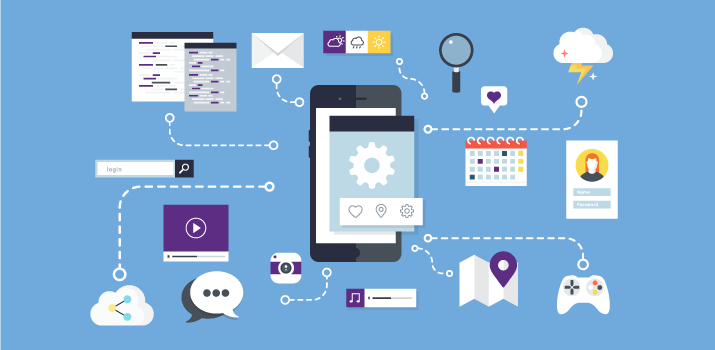Competing in the Mobile Market: iOS vs. Android Development

Now, it seems, is an opportune time to join the app development market. According to the Bureau of Labor Statistics, software developer positions are projected to increase 17 percent by 2024. App developers alone earn a mean annual wage of more than $102,000. However, successfully competing in the mobile market is an endeavor that requires a significant understanding of market conditions, development tools and the chances of making a profit. A key element in evaluating these factors is choosing the right operating system, iOS vs. Android, for development.
The Mobile App Market
Together, the Android and iOS operating systems currently make up around 99 percent of the smartphone market, reports Statista.com. Thus, the mobile app market is growing exponentially. By 2020, it is expected to reach a gross annual revenue of $101 billion, according to the market research firm App Annie. The firm predicts that the impact will be global. Not only will mature markets continue to see growth, but emerging markets will grow, particularly in countries such as India, Turkey, Indonesia, Argentina and Brazil.
It is important for developers seeking to gain footing in the mobile app market to understand the kind of apps that are in high demand. According to Jana.com, the two most in-demand types are utility apps (such as GPS systems or calculators) and those used for communication (Skype, Google Hangouts, etc.). While games are also in demand, their popularity varies depending on the geographical location of users. Apps that are less in demand but still notable include those for shopping, music and audio, and news and magazines.
App developers must understand where their products are most likely to be sold. Nearly 85 percent of all smartphones sold to end users are Android, Statista.com reports. While this seems to imply that Android is a better platform for developing apps, other factors such as earning potential and personal familiarization with development tools must also be considered for iOS vs. Android development.
Development Tools
To successfully build on either platform, developers must understand the tools and processes required to do so. Below are elements to consider for iOS vs. Android.
iOS
iOS is the operating system associated with Apple, the company responsible for creating iPhones, iPods, MacBooks and other products. According to Android Authority, keep the following in mind when developing within iOS:
- iOS can be coded in multiple languages, although they are specific to the operating system. These languages include Swift (specifically designed by Apple) and Objective -C. (For developers already familiar with C and C++, this can prove an easy language to learn.)
- iOS uses XCode as its development environment.
- The iOS system only runs on Apple devices. This means that the system is considered “closed” and does not have cross-functionality among the majority of app-supporting devices. This does, however, make it easier to fix coding problems when they arise.
- Developing on iOS generally has higher startup costs. Since it is a closed system, iOS can only be developed on Apple products, which tend to be expensive.
- Design elements tend to be more stringent. They require an overall minimalist look, a navigation system routed through a tab bar and thinner lines.
Android
Android is an operating system developed by Google. It can be found in a substantial variety of devices including tablets, smartphones, gaming systems and automobile computer systems, to name a few. Development considerations for Android systems include:
- Android is available on a wide range of devices. (Android can be found on more than 5,000 different devices, according to Upwork.com). Since the manufacturers, screen sizes and features all vary substantially, apps made with Android require significantly more testing in the development process.
- Android can be coded in multiple languages. Java is the most common. Others include HTML, CSS and Corona.
- Since Android is an open platform, it allows developers increased precision and decision-making. Tools such as Android Studio are also available to help with the development process.
- Outputs from the code tend to be complex, which can prove difficult for beginning coders.
- Android is compatible with most major operating systems and can be developed on machines that run Windows, Linux or Mac.
Which system to choose? A common solution is to simply learn both. Fluency in both systems is extremely helpful for maximizing an individual’s programming abilities and potential for success.
Costs, Publishing and Profitability
Major differences with iOS vs. Android development continue into the realm of accessing the marketplace and potential for profit. Considerations include:
iOS
- Developers are required to subscribe to Apple’s membership program in order to publish their apps in the Apple store. The fee for an individual developer is around $100 per year.
- Apple is strict about the products it wants for the Apple store. This means Apple checks apps far more stringently and has a higher rejection rate than Android.
- Apps from the Apple store tend to generate far more revenue than those on Android.
Android
- Although Android does not charge a membership or subscription fee, Google Play does charge a $25 one-time registration fee to developers in order to upload their apps.
- Publishing is easier than on iOS, only requiring an upload.
- Profits from using this platform tend to be lower.
Overall, there is no one right answer for app developers when deciding which system is better to pursue. Developers must weigh their current programming skills and knowledge, their preferences and their willingness to put forth the effort required to succeed.
Becoming an App Developer
For those seeking to join the app development market, the decision whether to choose iOS vs. Android can prove crucial to their success. Aspiring app developers can begin by earning an online computer science degree from Concordia University Texas. The program teaches students real-world skills that can be immediately applied to their careers.
